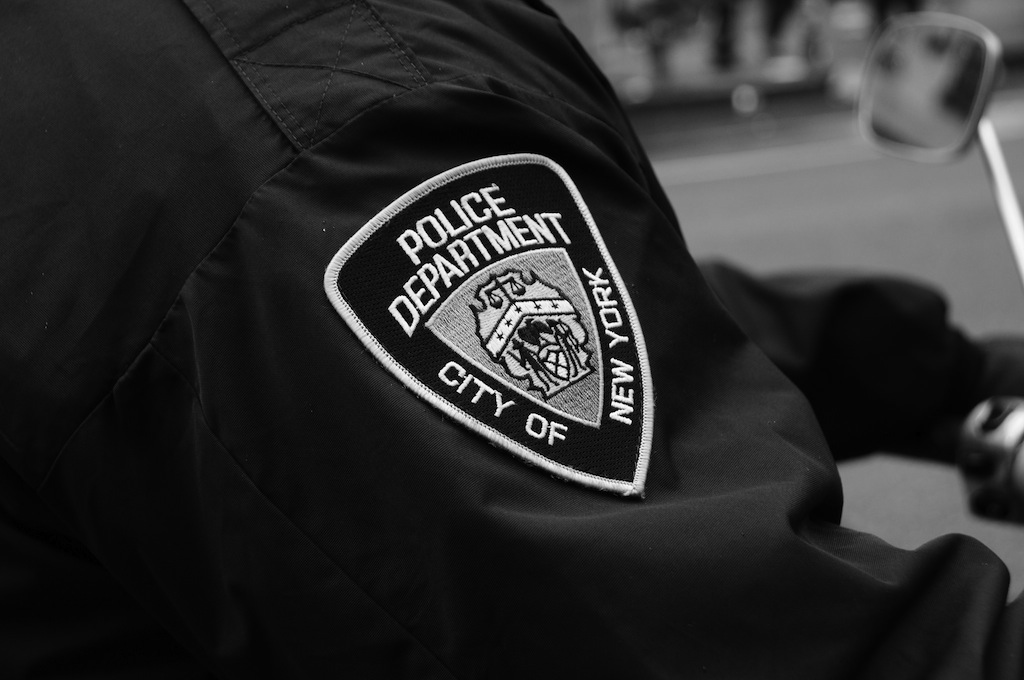Smash the Lynch Mob
The labor movement should rally against police violence, whether police unions like it or not.

Eino Sierpe / Flickr
Patrick Lynch, the president of New York City’s largest police union, should be everything the Right hates. Aggressive at the bargaining table, his more than twenty thousand members soak up taxpayer money in the form of negotiated wages, health care, and the city’s most coveted pension plan. Accountable to no one but the membership, this labor organization plays a huge role in shaping city policy.
Yet Lynch has been embraced wholeheartedly by the Right. Hailed by the likes of Fox News host Sean Hannity, Lynch now speaks for a self-proclaimed persecuted minority: cops. Lynch has blamed New York City Mayor Bill de Blasio for the recent shooting deaths of two cops by a clearly mentally unstable individual, claiming de Blasio’s (tepid) criticism of police has fostered a climate of anti-cop enmity.
In response to the wave of nationwide protests against police violence, Lynch has emerged as a spokesman for the status quo. With cops literally turning their back on de Blasio, Lynch’s members have drawn a clear line in the sand not just in New York, but between police advocates and anyone seeking reform.
It’s been powerful enough to provoke former New York City Mayor Rudy Giuliani back into the limelight, shaming de Blasio for his supposedly anti-police stance. Unfortunately he speaks for more than handful. “I share Mr. Lynch’s outrage at the lies that Mayor de Blasio has been telling about the police,” Heather MacDonald of the conservative Manhattan Institute said in an email. “In the present moment, someone needs to be out there telling the truth and defending the cops and Mr. Lynch appears to be the only one doing so.”
MacDonald didn’t specify what de Blasio’s lies are. In fact, he’s been an open advocate of “broken windows” policing — a policy her employer champions — and even lashed out at protesters who defied a call to hold off on demonstrations until after the slain cops’ funerals. Contra MacDonald, de Blasio has carefully stayed in the middle, saying recently, “We need to protect and respect our police just as our police protect and respect our communities. We can strike that balance. We must.”
Brooklyn College sociologist Alex Vitale interprets the police union leader’s vitriol both as a reflection of rank-and-file sentiment and callous political maneuvering:
Pat Lynch has an election coming up next spring and he’s rolling out his campaign of jingoistic attacks on anyone who dares to raise public criticism of the NYPD. What bothers me is not so much that he would say something like this, but that he believes this is the way to get rank-and-file support from his members. It suggests that the world view of many police officers is that to criticize us is to embrace bedlam and murder.
Something else is at work, too. De Blasio is the personification of a worrying trend for conservatives: a prominent government executive plucked from the progressive end of the Democratic Party who represents at once a rise in economic populism and a resurgent urban liberalism. Conservatives see an opportunity to tarnish de Blasio with the “soft on crime” label. It’s already having an effect. Democrats in Albany, including one who called the mayor “toxic,” are imploring him to mend ties with the cops.
The Right’s alliance with Lynch is cynical, but also potentially tenuous. Crime is still down, a fact that punctures the cops’ argument. Many PBA members don’t live in the city, and thus don’t constitute a voting bloc; de Blasio won the election overwhelmingly despite claims from his opponent that Democratic leadership would lead to more crime.
In addition, at least a portion of Lynch’s rank-and-file doesn’t appear to be as apoplectic as Lynch. Non-white members have voiced concerns about the police’s relationship with black and Latino communities. Police anger is visible, especially in the case of the back-turning protests. But at least for now, it’s tamer than in other periods. A pro-cop rally earlier this month turned out several dozen members. Contrast that with 1992, when thousands of enraged police officers stormed City Hall in protest against a proposed civilian review board.
Lynch’s union is also one of the biggest municipal unions without a contract. While commanding officers in the police have secured a deal with an 11 percent raise over seven years (some of which is retroactive for years the unions operated without collective bargaining agreements). De Blasio could easily cite ongoing tensions as reason to delay negotiations, leaving members waiting to be included in the pattern.
It’s often said that a union president is only as popular as the last contract. Such a delay could anger the membership against Lynch, making way for an opposition candidate.
But other unions shouldn’t wait for a “progressive” cop to emerge in New York. Police unions have long been distinct from the labor movement. Structurally, their allegiance must be to the repressive state rather than the broader working class.
What the movement against police violence needs now is the active participation of more unions and an intra-labor-movement effort to marginalize police unions — no easy task. The United Federation of Teachers (UFT) drew heat from Lynch’s union just for participating in a permitted march with Rev. Al Sharpton after Eric Garner’s death.
Union involvement is immediately practical — the UFT acted because many teachers have spoken out about the school-to-prison pipeline, and unions have black and Latino members who are victims of police violence — but also essential to creating a labor movement that fights against societal injustices, not simply for a better contract.
Unions were pivotal in the civil rights movement. They must act again as agents for social change. The struggle for economic justice is inseparable from the struggle against police violence.